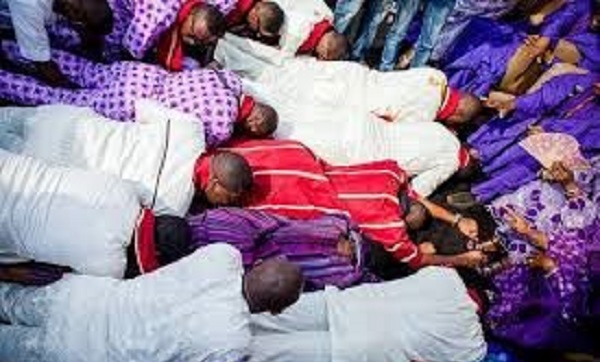“In Yoruba culture even if the groom’s attire is made of gold, he and his friends must prostrate on the floor before the bride’s family. The entire body must be on the floor, stretched in a line. The chest must touch the floor,” Abdulrasaq said while speaking with 21st CENTURY CHRONICLE.
Olayode Abdulrasaq Olawole is a marriage counsellor and resides in Abuja. He said Yoruba people consider marriage an important part of their culture and care must be taken that people who intend to marry follow the marriage rituals with all seriousness.
According to him, for a man or woman who has reached the age of marriage to remain single is against the mores of the Yoruba and a man can get married even if he is sexually impotent, in order to save face for himself and his immediate relatives, as well as to get one to look after his domestic establishment.
“A woman who is single at a marriageable age is also seen as a crownless woman,” he further said, but quipped that in modern times, some men have chosen to remain “confirmed bachelors.”
“There are a few cases of individualism, and this is a negative effect of modernisation on culture,” Abdulrazaq added, even as he clarified that there’s no room for forced marriages in Yoruba land.
Explaining further, he said in an ideal situation, marriage should establish the foundation of the family and is a union not only of the two spouses, but the two extended families to which they belong and when two people marry, it is proof that both of them are good products and ambassadors of their families and have shown restraint as people who are well brought up, focused, enduring, reliable, disciplined, and people who are able to defer gratification until they are ready for the responsibilities of adulthood.
Lawrence Ashaolu who is Yoruba and married to an Urhobo lady said although at his own marriage there was a mix of cultures, generally, Yoruba marriage is divided into two segments: introduction and the engagement ceremony.
Introduction
This first stage requires a personal visit, which the groom and his family must pay to the bride’s family. He goes to their home accompanied by his father and a couple of friends and such a visit helps the future spouses and their parents get to know each other better.
The groom’s party brings gifts for the bride’s family, and the bride’s family entertains them with good food, assorted drinks and some gift items including a basket of selected fruits which is priority.
Engagement
This is the most crucial part of the marriage rites and normally takes place at the bride’s house. One of the most notable rites on this day is the prostrating act. The groom and his friends show their respect for the family of the bride by literally stretching out on the floor, facedown, at the feet of the bride’s party.
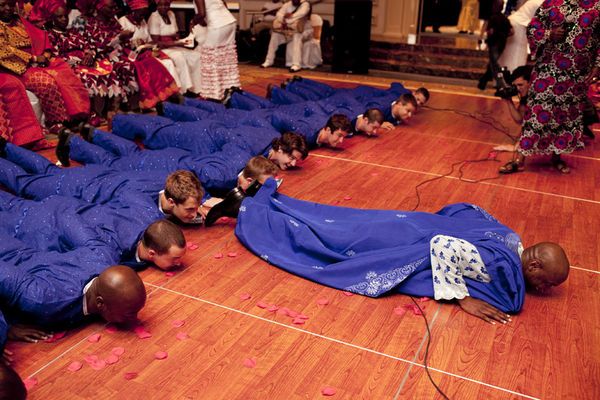
Even if the groom’s attire is made of gold, he and his friends must stretch lie on the ground before the bride’s family. The entire body must be on the floor, stretched into a line. The chest must touch the floor.
Goods of necessity
Yoruba culture demands that during a marriage, items of both spiritual and social value are presented to the bride’s family. They include:
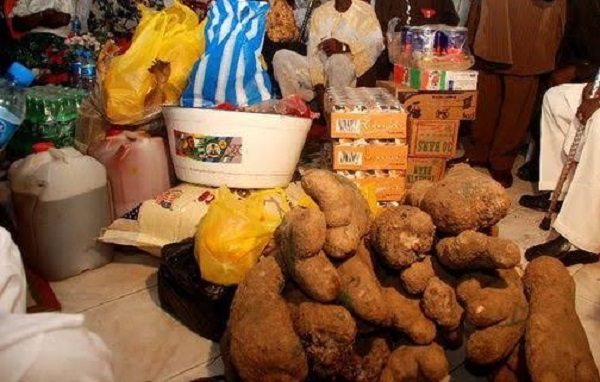
Oyin: a bottle of wild honey, which symbolises that a couple’s life will be sweet like honey; and be blessed with promising children.
Atare: Alligator pepper which comes in a pod with multiple seeds, and symbolises blessing, healthy and prosperous children for the couple.
Adun: A local cake made from groundnut which signifies sweetness, blessing and prosperous future for the couple and their children.
Ọti-Ṣẹkẹtẹ: This local wine represents water, which is life, treasured for its multiple uses. Since no one ever dislikes and speaks evil of water, the couple will live a peaceful life, free of hate and dislike.
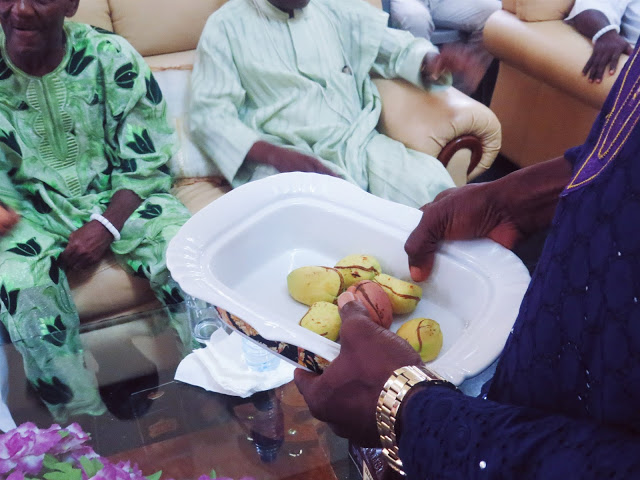
Obi-Abata: Kolanut with four halves, 42 or 100 pieces. In some cases it can more – Kolanut has several social and spiritual values in Yoruba culture. When it comes to marriage, it symbolises fertility. The kolanut brought on this day is used to pray for the fruit of the womb.
Orogbo: this is bitternut and no fewer than 42 pieces must be presented. This represents old age, prosperity and a trouble-free world; this means, the couple will live a long life in good health, and see generations of their children.
Epo-pupa: This is palm oil and has several uses, one of which is the antidotal value. The palm oil suggests that no evil will befall or overreach the couple.
Iyọ: This is salt, which is used as a preservative and sweetener; symbolically, salt in the life of the couple will represent joy and a trouble-free life.
Yams: Between 30 and 100 tubers of yam, depend on the status and wealth of the groom’s family are also presented.
Aso-ebi
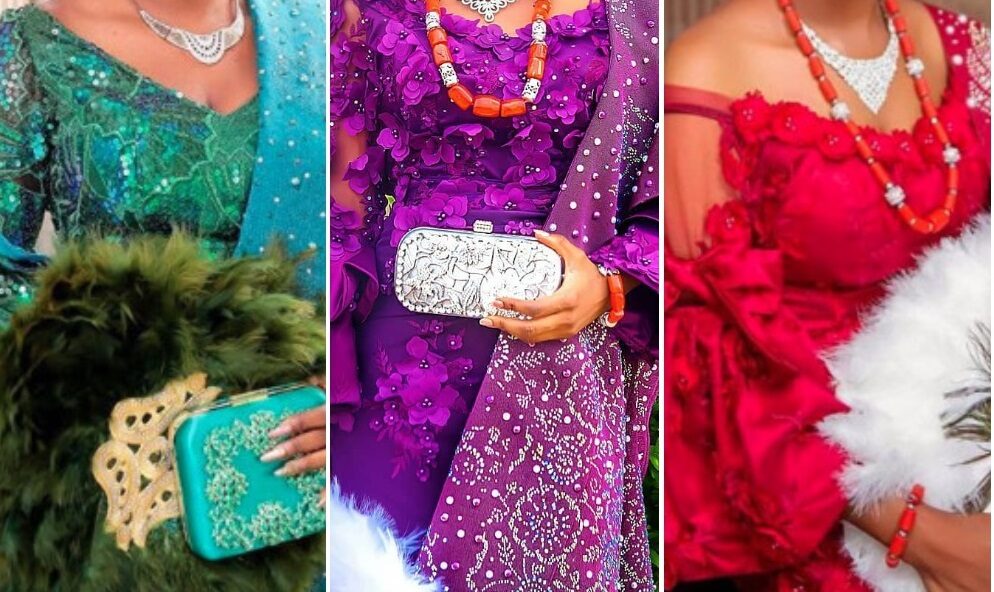
A Yoruba traditional marriage day is a day to “show off clothes”. Families wear special themed outfits, traditionally called aso ebi to add colour to the event. Aso oke, a largely hand woven cloth, mostly used by the Yoruba, is usually on show on this day.
The parents of the couple are specially adorned, especially the mothers, while the bride has an array of costumes and outfits she changes into at different stages of the event.
Food is also very important on marriage days and both families must ensure that there is enough food for the wedding guests. In most cases, the bride’s family takes pride in providing all the food for guests.
Alaga
No one will miss the Alaga at any Yoruba Marriage ceremony. Shola Adesanya (not real name) whose mother is often the Alaga for the family, said although a man could also be a spokesperson for a groom or bride’s family, most Alaga are female and sometimes appear as the traditional marriage coordinator or Master of Ceremonies.
She is the one “commanding” the groom and his family and friends to “lie down flat, if not your wife won’t be handed to you.”
She would sometimes ask the groom to do outrageously funny things like jumping up to show excitement at marrying the most beautiful girl in the community. Normally supported by drummers, Alaga adds so much excitement and fun at a Yoruba Traditional marriage ceremony.
Apart from keeping guests entertained and directing proceedings at the ceremony, there is another interesting thing to not with them. The Alaga only speaks Yoruba while leading the proceedings
“What happens if the groom is not Yoruba Speaking?”, 21st CENTURY CHRONICLE sought to know, to which Shola said “he has to pay for an interpreter.”



